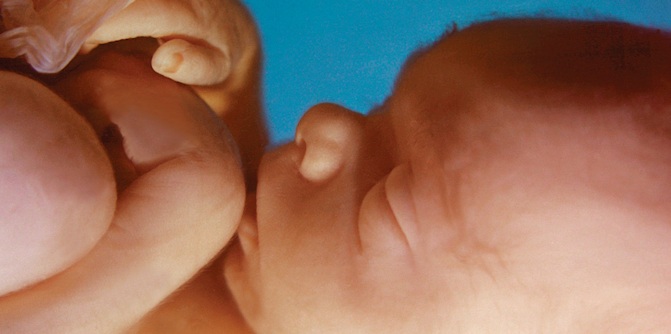Attorneys from the office of Ohio Attorney General Dave Yost are asking the state’s highest court to uphold the state’s abortion ban — a heartbeat law that protects babies with beating hearts from abortions.
Previously, Hamilton County Common Pleas Court Judge Christian Jenkins put the law on hold while the case continues, making a bogus claim that the state constitution allows abortions. Yost has appealed that decision to the Ohio Supreme Court, asking that it allow the state to enforce the abortion ban while the underlying case continues.
Yost’s office has filed a 100-page merit brief also argued challengers did not “have standing to challenge the Heartbeat Act.”
“The Act protects unborn children and mothers alike,” attorneys for the state said. “It protects unborn children by largely prohibiting doctors from ending the lives of those whose hearts have started to beat.”
In asking for the appeal, the state also said the overall lawsuit seeking to stop the abortion ban attacks every branch of government, including “the executive branch’s power to defend, and the judicial branch’s power to invalidate, the legislative branch’s work.”
The merit brief also accused the First District Court of Appeals, who upheld the pause in the six-week abortion ban, of establishing “a precedent empowering trial courts around the state to hold state laws hostage.”
HELP LIFENEWS SAVE BABIES FROM ABORTION! Please help LifeNews.com with a donation!
“Further, if the state is forced to wait for a final judgment before appealing, there will be no way to compensate the state later for the thwarting of its right to protect lives lost in the interim,” attorneys for the state wrote.
The Ohio Attorney General’s Office also said “doctors have no right to perform abortions,” and using the argument that the abortion ban violates patients’ rights isn’t something doctors can do. A “third-party standing,” in legal terms, should be someone who sues because there is a “sufficiently close relationships with the person,” attorneys for the state said, citing previous case law.
“After all, how can the plaintiffs have a ‘close relationship’ with hypothetical future plaintiffs whose identities are literally unknowable,” the state asked in its merit brief.
Ohio abortion business filed suit in state court seeking to overturn the pro-life heartbeat law that was saving babies from abortions following the Supreme Court decision to overturn Roe v. Wade.
After the decision, Ohio Governor Mike DeWine issued an executive order directing the Ohio Department of Health to adopt emergency rules implementing Ohio’s Heartbeat Law. This Executive Order was in response to the federal court lifting the injunction on Ohio’s Heartbeat Law. Attorney General Dave Yost filed a legal request to lift the injunction due to the United States Supreme Court ruling in the Dobbs v Jackson Women’s Health Organization case.
With the Ohio Supreme Court’s decision rejecting the pro-abortion request for an injunction, abortions were banned in Ohio starting at 6 weeks, when an unborn baby’s heartbeat can be detected.
Preterm-Cleveland, Planned Parenthood Greater Ohio and other abortion businesses were behind the lawsuit. In addition to Preterm and Planned Parenthood, plaintiffs include Planned Parenthood Southwest Ohio, Women’s Med Group Professional Corp. in Dayton, Northeast Ohio Women’s Center, Toledo Women’s Center and Dr. Sharon Liner, an individual abortionist.
The lawsuit specifically argues the Ohio Constitution’s due process rights under the Due Course of Law Clause protects women’s reproductive autonomy and bodily integrity. The heartbeat law discriminates against women, in violation of the Equal Protection and Benefit Clause, the lawsuit claims.
As LifeNews reported, the Supreme Court overturned Roe v. Wade, with a 6-3 majority ruling in the Dobbs case that “The Constitution does not confer a right to abortion” — allowing states to ban abortions and protect unborn babies. The high court also ruled 6-3 uphold the Mississippi 15-week abortion ban so states can further limit abortions and to get rid of the false viability standard.
Chief Justice John Roberts technically voted for the judgment but, in his concurring opinion, disagreed with the reasoning and said he wanted to keep abortions legal but with a new standard.
“Abortion presents a profound moral question. The Constitution does not prohibit the citizens of each State from regulating or prohibiting abortion. Roe and Casey arrogated that authority. We now overrule those decisions and return that authority to the people and their elected representatives,” Alito wrote.
“Roe was egregiously wrong from the start. Its reasoning was exceptionally weak, and the decision has had damaging consequences,” Alito wrote. “And far from bringing about a national settlement of the abortion issue, Roe and Casey have enflamed debate and deepened division.”
Justices Sonia Sotomayor, Elena Kagan and Stephen Breyer authored a joint dissent condemning the decision as enabling states to enact “draconian” restrictions on women.
Polls show Americans are pro-life on abortion and a new national poll shows 75% of Americans essentially agree with the Supreme Court overturning Roe.
Despite false reports that abortion bans would prevent doctors from treating pregnant women for miscarriages or ectopic pregnancies, pro-life doctors confirm that is not the case. Some 35 states have laws making it clear that miscarriage is not abortion and every state with an abortion ban allows treatment for both.








